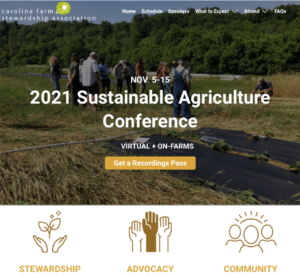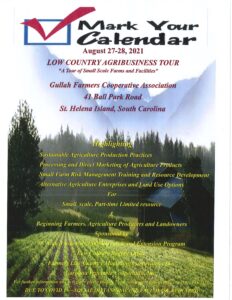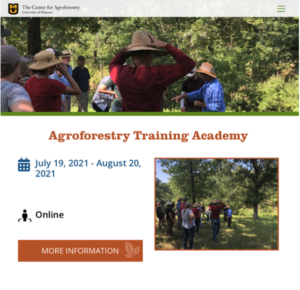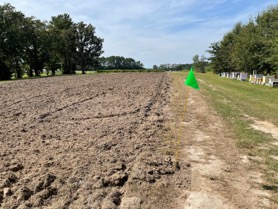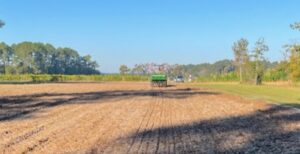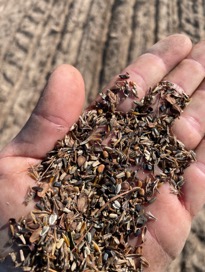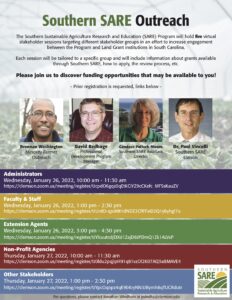Final report for SSC20-001
Project Information
The overall objectives of the 2022-2023 SC SARE Program will be to continue the existing strategic and collaborative planning process for statewide sustainable agriculture development; provide professional development opportunities for Extension agents, NRCS field staff and other agriculture professionals; reward outstanding service; and to continue to organize and support in-service training in sustainable agriculture practices. The MSP Assistant will work with the state SARE coordinators and program advisory committee to organize training activities for 1890 and 1862 Extension and other agriculture professionals that will address critical needs identified by program stakeholders. The program is guided by stakeholder input through an advisory committee consisting of farmers, agriculture professionals, non-government representatives and others with an interest in sustainable agriculture development. Our mission/strategic plan is to foster the adoption of sustainable agriculture practices statewide through education and outreach programs on relevant topics for Cooperative Extension Service personnel, Natural Resources Conservation Service staff and other agriculture professionals, farmers, and landowners. The overall program mission/plan will not change however, training topics have been revised based on current needs identified by our program stakeholders. The program advisory committee met on January 10, 2022, and identified priority topics for 2022 training programs (meeting minutes here). The MSP position will continue to facilitate program reporting and evaluation and will assist with project accounting and budgeting. A joint budget for Clemson and South Carolina State University has been developed. Funds will be administered through Clemson; South Carolina State University will submit invoices for training expenses to the Clemson Sustainable Agriculture Program.
- Continue the existing strategic planning process for statewide sustainable agriculture development. Building on new and existing collaborations with stakeholder groups, the state co-coordinators will work with the MSP Assistant and with the SC SARE Advisory Committee to broaden the pool of stakeholders including under-represented groups who are involved with the planning process and the development of educational programs. As in previous years, an annual public Open Forum will be organized in January to identify priorities and to plan educational programs based on stakeholder needs. We will continue to collaborate on training programs with stakeholder organizations and with SARE PDP personnel from neighboring states when appropriate. The comprehensive and inclusive planning process will limit duplication of effort and will help to leverage available resources.
SC SARE 2022 Open Forum - Minutes
- Continue to provide professional development opportunities for Extension agents, NRCS, FSA and state Department of Agriculture staff and other sustainable agriculture educators. The outcomes of this objective are that our agriculture professionals will enhance their knowledge and competency in sustainable agriculture, they will increase their contact with the sustainable agriculture community, and they will be recognized as local experts to be called upon for information on sustainable agriculture. Travel scholarships will be provided for select Extension agents and agricultural professionals to attend various sustainable agriculture education events as funds are available. These events represent valuable educational opportunities for our agents and other agriculture professionals and facilitate interactions between agriculture professionals and farmers.
- Continue to support the “Outstanding Sustainable Agriculture Extension Agent of the Year” award to recognize SC cooperative extension personnel for excellence in sustainable agriculture outreach. A call for nominations will be released in summer of each year open to 1890 and 1862 personnel. The award recipient will receive a travel scholarship to attend a sustainable agriculture event and a plaque recognizing their service to the sustainable agriculture community. The award will continue to encourage the development of innovative public outreach programs by our Extension agents.
Advisors
- (Researcher)
- (Educator)
- (Researcher)
- (Educator)
Education
To the extent possible we emphasized an interdisciplinary and participatory approach to training. Primary audiences for the trainings were 1862 and 1890 Extension agents, NRCS conservation field staff, and other agriculture professionals. Agriculture professionals who serve small and large scale farms, both conventional and organic/regenerative, were encouraged to attend. 2022 saw the promotion of the Southern SARE Program through a two-day virtual site visit that targeted a wide range of stakeholders (administrators, faculty/staff, extension agents, non-profits, and others). This was an effort to increase statewide interest in the Southern SARE Program and subsequently the number of Southern SARE grants awarded to South Carolina.
Participants in the educational programs increased competency and skills in areas related to sustainable agriculture. They gained the knowledge and confidence (i.e. competency) to enable them to respond positively and knowledgeably to client inquiries regarding principles and practices of sustainable agriculture. Participants also gained valuable insight into the types of grants offered by both Southern SARE and SC SARE, along with insight into the stipulations involved with certain grants.
Education & Outreach Initiatives
To disseminate knowledge regarding sustainability to Extension agents
An announcement was emailed to Clemson University and SC State University extension agents inviting them to request hardcopy publications that the SC SARE program had in stock for distribution to trainers.
To assist in the dissemination of the SARE publications, a virtual library of publications available-for-request was created. This virtual library allows trainers in our state to see which National SARE publications the SC SARE program has available for request. Emailing a link to the virtual library for trainers to peruse was a more eloquent solution compared to emailing a list of available publications, as the virtual library includes additional information such as publication descriptions, cover photos, and links to download said publications from the National SARE program website.
https://scsare.libib.com/i/national-sare-program-publications
The outcome of this initiative was that Extension agents were given direct access to knowledge regarding sustainable practices, which they will use in turn to train farmers, growers, students, and homeowners. Having a hardcopy available meant that agents did not have to rely on electricity or an internet connection to obtain the desired information.
Input from this public meeting was used to prioritize issues and formulate plans for statewide sustainable agriculture training and education programs in 2022.
On January 10, 2022, SC SARE hosted its annual open forum (both in-person and virtually). This open forum allowed for networking among extension agents, farmers, agencies, non-profits, and researchers while providing the SC SARE program with feedback regarding areas that these stakeholders felt should be focused on for 2022.
Registrants were asked what they felt were the top three areas in which SC SARE should focus on in 2022. This raw data was shared with the SC SARE advisory committee (and general public) in the meeting minutes. With input from the event registrants and further input from the advisory committee, topic areas were prioritized for statewide programing in 2022 (topics listed in minutes below).
To provide funding for Extension agents to attend the 2021 Carolina Farm Stewardship Association Sustainable Agriculture Conference. To participate as a conference sponsor.
The goal of this initiative was to provide Extension agents with access to the conference talks given regarding sustainable practices and provide them with an opportunity to network with those in the sustainable agriculture community. Exposure to these topics and the connections made at this conference directly impact trainer knowledge and resources. Agents witness first-hand the practices that others are employing in different regions which better allows them to prioritize what practices would be best for stakeholders in the agent's region. Networking opportunities open the door for collaborations, which are critical when applying for competitive grants. This conference was also an opportunity to publicize the SC SARE Program.
To introduce sustainable agriculture production practices
To provide training activities to encourage limitation of off farm inputs and maximize on farm output
To highlight small scale agriculture enterprises and activities on St. Helena Island
To revisit the historical nature of the Island as it relates to agriculture production and marketing of farm products
To showcase modern up to date processing of agriculture products
To provide updated information on innovative technology and/or online marketing of farm products, direct marketing strategies
To demonstrate direct marketing strategies, entrepreneurship, and roadside marketing displays
To highlight alternative agriculture enterprises and land use options for small, limited resource farmers, producers, and small scale landowners
To provide updates on small farm agriculture risks management practices
To increase awareness of available agriculture related resources, grants, small farm assistance programs
To introduce local, regional, small farm cooperatives, young farmers groups and organizations
The tour is designed as a workshop training session for small, limited resource, and/or socially disadvantaged farmers, producers, beginning farmers and landowners. The tour highlights sustainable agriculture production practices, processing and direct marketing of agriculture products, small farm risk management practices and resource development, alternative agriculture enterprises, and land use options.
Low Country Agribusiness Tour - Recording
Expected Accomplishments/Outcomes:
Participants will have a better knowledge of sustainable agriculture production, direct marketing, and risk management
Indicators:
Follow up visits, on-farm observations, and farmer reports following an evaluation checklist will be used to monitor indicators.
To provide funding for trainer to attend the 2021 Agroforestry Training Academy.
Funding was provided by SC SARE to cover registration fee for trainer Mary Powers of Heirs Property to attend the 2021 Agroforestry Training Academy.
2021 Agroforestry Training Academy
The goal of this initiative was to provide the trainer with access to the conference talks given regarding sustainable practices and provide them with an opportunity to network with those in the sustainable agriculture community. Exposure to these topics and the connections made at this conference directly impact trainer knowledge and resources.
To train organizational leaders how to assemble and operate a suburban chicken tractor. Leaders will then be equipped to train homeowners in their communities.
Suburban Chicken Tractor (SCT) Training Series
A series of "Assembly Training Days" where organizational leaders are trained to assemble and operate the SCT.
During the training days, videos will be taken of the whole process. The training videos will be edited and then posted on social media sites like YouTube & Facebook. The videos will leverage the power of social media in a positive way by showing other like minded individuals & organizations how easy and rewarding it is to raise laying hens in an urban setting.
Much of our grassy/weedy areas (think abandoned lots) in our cities are not being used for positive purposes. Training people to assemble and operate Suburban Chicken Tractors can help turn these non-utilized plots into healthy food producing, soil regenerating, sustainable plots.
Project led by Rick Eich <ricktarios@anorthodoxworkshop.com>
During the Train the Trainer events we will be assembling the Suburban Chicken Tractor & showing how to operate and maintain it. During the first few training events, the plan is to shoot video fo the process. After editing, the training videos will be posted on social media sites so that they become available to anyone who is interested in raising chickens in an urban/suburban setting.
The expectation is that people will be encouraged to raise chickens in their urban/suburban setting using the Suburban Chicken Tractor. Results will be indicated by widespread adoption and use of the Suburban Cicken Tractor. Also, the number of views and "likes" on the various social media outlets will show how well this solution is being accepted.
To establish a demonstration apiary at the Pee Dee Research and Education Center with accompanying pollinator habitat test plots
SC SARE partially supported an initiative to establish a demonstration apiary at the Pee Dee Research and Education Center in Florence, SC (summer 2021).
This was followed by the installation of new pollinator habitat test plots (October 2021).
These projects were led by Clemson Apiculture and Pollinator Program specialist Ben Powell
This demonstration apiary will be used for apiculture research and in-service trainings. These trainings will educate home beekeepers and professional producers on best management practices for their hives, ideally increasing pollination rates among their crops while promoting biodiversity.
The pollinator habitat test plots will be used in testing maintenance strategies and extension publications. A field day detailing these efforts is planned.
To educate the public regarding Southern SARE funding opportunities
Southern SARE, in partnership with SC SARE, held five virtual stakeholder sessions targeting different stakeholder groups in South Carolina in an effort to increase engagement between the Program and Land Grant institutions. Each session was tailored to a specific group and included information about grants available through Southern SARE, how to apply, the review process, etc.
Expand the video description box to view video chapters for easy navigation along with hyperlinks to resources mentioned in the videos.
- Administrators Session: https://youtu.be/I5pkDV9JIFY
- Faculty & Staff Session: https://youtu.be/cPrf48KMVnM
- Extension Agents Session: https://youtu.be/QVUpTNqqb9E
- Non-Profit Organizations Session: https://youtu.be/9bZFIOZMLYg
- Other Stakeholders Session: https://youtu.be/ZX4N5SDs3fE
https://calendar.clemson.edu/event/southern_sare_outreach#.Yeh1wS2ZNgc
Outreach to five target populations (to include a combination of presentations and discussions)
Target stakeholders: 1862 and 1890 Institution Agriculture Administrators
Anticipated Outcomes for Admin:
- Recognition of S-SARE by administrators at all levels
- Support of S-SARE through communications/messaging to faculty, extension staff, researchers, grad students
- Increase in receipt of grant funds
Target stakeholders: 1862 and 1890 Institution Agriculture Faculty and Staff
Anticipated outcomes:
- Increased receipt of grant funds
- Recognition of S-SARE resources and use in research and extension program
- More engagement in SARE – including, but not limited to, grant proposal review
Target stakeholders: County Agricultural Extension Agents
Anticipated outcomes:
- Increased receipt of grant funds (esp. On-Farm and Professional Development Program grants)
- Recognition of SARE resources and use in research and extension programs
- More engagement in SARE – including, but not limited to grant proposal review
- Support of farmers working on SARE projects and proposals
Target stakeholders: Non-Profit Agencies
Anticipated outcomes:
- Increased receipt of grant funds
- Support of existing partnerships and support for new partnerships
- Recognition of SARE resources and use in research and extension programs
- More engagement in SARE – serving on committees and providing feedback
Target stakeholders: Others (such as government agencies and non-land-grant agriculture colleges)
Anticipated outcomes:
- Help SARE understand roles of this group and their needs
- Recognition of SARE resources and use in programs conducted by these organizations
- More engagement in SARE – including, but not limited to grant proposal review
Educational & Outreach Activities
Participation Summary:
Learning Outcomes
Project Outcomes
Face of SARE
The SC SARE webpage was again revised and updated to include the new SCSU Co-Coordinator and additional SARE Resources. The webpage is an important promotional tool for allowing us to post updates, events, and news regarding the SC SARE program.
The SC SARE listserv is contacted regularly and instructions to unsubscribe are made clear for anyone who wishes to do so. This is important to prevent SC SARE from developing a reputation for being "spammy". The listserv is used to share updates about the SC SARE program and news from related programs.
Television host of ETV's Making it Grow Amanda McNulty was contacted to ask if she would help promote SC SARE. She graciously agreed and recorded a short 5 second commercial that will air on her podcast. Amanda writes "These air three times a day on every single SCPublic Radio channel four days a week, once on Saturday, during “drive time” and about 100,000 people hear them. Then a week later, the series airs again. I hope this will help spread the word about this valuable project."
